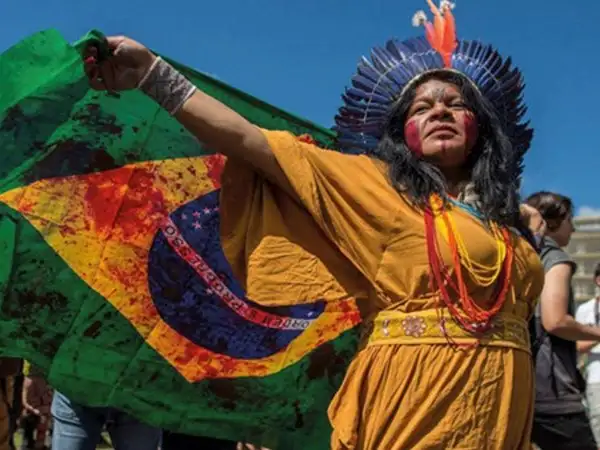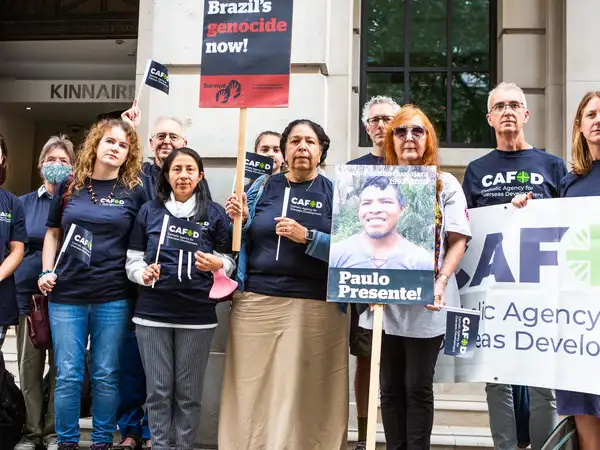

Indigenous peoples are the best conservationists and guardians of the natural world
On Wednesday 25 August, Brazil's supreme court (STF) was expected to rule on a landmark case regarding the Xokleng indigenous people’s right to their ancestral land.
The government of Santa Catarina state and a logging company have filed a repossession lawsuit. They claim that the Xokleng only lived on limited parts of the territory on 5 October 1988 – the date Brazil’s current constitution was enacted – and that they have no right to their ancestral land.
We believe this is wrong.
CAFOD has worked alongside indigenous people in the Amazon for many years, and has witnessed time and time again how they are threatened, expelled and forced from their land. Brazil’s president Jair Bolsonaro and political parties that support his policies are dismantling any government agency responsible for protecting indigenous rights, and working to remove all indigenous rights from the constitution.
What is the "time limit trick"?
“The Time Limit Trick is a genocidal attempt to manipulate the Brazilian constitution, claiming that if indigenous peoples were not living on their land on 5 October 1988 – the date of the signing of Brazil’s constitution – they don’t have the right to live there. If approved, dozens of uncontacted tribes and hundreds of indigenous territories could be affected.”
The marco temporal, or “time limit trick”, violates international law, including the Indigenous and Tribal Peoples Convention (ILO 169), which clearly states that indigenous peoples have the right to their ancestral lands, and which Brazil ratified in 2002.
Indigenous grassroots organisations we work alongside, as part of a network of indigenous organisations (APIB), have been participating in protests in the capital, Brasilia, since 23 August. They believe that, against the backdrop of slashed environmental protections, illegal mining, deforestation and increased fires, a ruling against the Xokleng indigenous people’s right to their land will all amount to an intention of totally or partially destroying a national, ethnic, racial or religious group – which is genocide under international law.
“Why is it taking so long to believe that if we hurt nature, we hurt ourselves?”
Why is the court ruling in Brazil so important?
The consequences for many other indigenous peoples could be devastating because, if the time limit trick is approved, it would form a legal basis enabling the theft of land that is rightfully owned by hundreds of thousands of tribal and indigenous people in Brazil – also setting the stage for environmental catastrophe.
Indigenous peoples are the best conservationists and guardians of the natural world. They manage their environment and its wildlife better than anyone else.


CAFOD supporters and staff protest outside the Brazilian Embassy in London on 25 August 2021 in support of the rights of indigenous peoples in Brazil.
What is the situation now?
Over 1,000 indigenous people continue to protest peacefully outside the court in Brasilia, at great personal cost. Through local and international solidarity, some food is being provided to them – they represent over 900,000 indigenous voices showing incredible resilience.
In London, a demonstration organised by CAFOD, Amazon Rebellion, Brazil Matters, Greenpeace, Parents for the Future and Survival International, in solidarity with the Articulation of Indigenous Peoples in Brazil (APIB), took place to oppose the ruling and call for indigenous rights to be guaranteed.
On 2 September, arguments were heard by those opposing the land repossession and, in a surprising turn of events, the Attorney General made a speech in which he appeared to oppose the marco temporal. Whilst APIB lawyers still need to evaluate the content of that speech, it seems, for now, to be a first victory of the indigenous peoples.
The court case will continue on 8 September.
What can I do to support Brazil’s indigenous peoples?
Sunday 5 September is Amazon Day in Brazil. It is a day on which, traditionally, we celebrate the Brazilian Amazon. It is more important than ever that we stand in solidarity with indigenous peoples and other peoples of the Amazon.
As Cardinal Cláudio Hummes, president of the Amazonian Bishops Conference, says:
“The crucifixion of the Amazon unleashes suffering for many sons and daughters of God…but we must be realistic and hopeful. Our faith gives us the certainty that it was in the middle of the darkest night that the light of resurrection imposed itself.”
He invites us to celebrate this day, mindful of the current destruction, and to engage in the struggle to preserve and care for the Amazon and our common home:
“I invite you to celebrate it by carrying out symbolic gestures: planting a tree, revitalising your gardens at home, or becoming informed about how and where the food we share on our tables is produced. By making these commitments, and by celebrating our beloved Amazon, we will see its death transformed into its resurrection."

